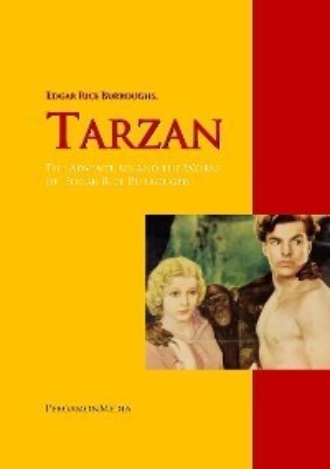
Полная версия
Tarzan: The Adventures and the Works of Edgar Rice Burroughs
Following Malbihn's instructions they launched all the canoes but one. Malbihn called to the guards in the camp and a moment later the entire party had entered the boats and were paddling up stream.
Meriem watched them until a bend in the river directly above the camp hid them from her sight. They were gone! She was alone, and they had left a canoe in which lay a paddle! She could scarce believe the good fortune that had come to her. To delay now would be suicidal to her hopes. Quickly she ran from her hiding place and dropped to the ground. A dozen yards lay between her and the canoe.
Up stream, beyond the bend, Malbihn ordered his canoes in to shore. He landed with his head man and crossed the little point slowly in search of a spot where he might watch the canoe he had left at the landing place. He was smiling in anticipation of the almost certain success of his stratagem—sooner or later the girl would come back and attempt to cross the river in one of their canoes. It might be that the idea would not occur to her for some time. They might have to wait a day, or two days; but that she would come if she lived or was not captured by the men he had scouting the jungle for her Malbihn was sure. That she would come so soon, however, he had not guessed, and so when he topped the point and came again within sight of the river he saw that which drew an angry oath from his lips—his quarry already was half way across the river.
Turning, he ran rapidly back to his boats, the head man at his heels. Throwing themselves in, Malbihn urged his paddlers to their most powerful efforts. The canoes shot out into the stream and down with the current toward the fleeing quarry. She had almost completed the crossing when they came in sight of her. At the same instant she saw them, and redoubled her efforts to reach the opposite shore before they should overtake her. Two minutes' start of them was all Meriem cared for. Once in the trees she knew that she could outdistance and elude them. Her hopes were high—they could not overtake her now—she had had too good a start of them.
Malbihn, urging his men onward with a stream of hideous oaths and blows from his fists, realized that the girl was again slipping from his clutches. The leading canoe, in the bow of which he stood, was yet a hundred yards behind the fleeing Meriem when she ran the point of her craft beneath the overhanging trees on the shore of safety.
Malbihn screamed to her to halt. He seemed to have gone mad with rage at the realization that he could not overtake her, and then he threw his rifle to his shoulder, aimed carefully at the slim figure scrambling into the trees, and fired.
Malbihn was an excellent shot. His misses at so short a distance were practically non-existent, nor would he have missed this time but for an accident occurring at the very instant that his finger tightened upon the trigger—an accident to which Meriem owed her life—the providential presence of a water-logged tree trunk, one end of which was embedded in the mud of the river bottom and the other end of which floated just beneath the surface where the prow of Malbihn's canoe ran upon it as he fired. The slight deviation of the boat's direction was sufficient to throw the muzzle of the rifle out of aim. The bullet whizzed harmlessly by Meriem's head and an instant later she had disappeared into the foliage of the tree.
There was a smile on her lips as she dropped to the ground to cross a little clearing where once had stood a native village surrounded by its fields. The ruined huts still stood in crumbling decay. The rank vegetation of the jungle overgrew the cultivated ground. Small trees already had sprung up in what had been the village street; but desolation and loneliness hung like a pall above the scene. To Meriem, however, it presented but a place denuded of large trees which she must cross quickly to regain the jungle upon the opposite side before Malbihn should have landed.
The deserted huts were, to her, all the better because they were deserted—she did not see the keen eyes watching her from a dozen points, from tumbling doorways, from behind tottering granaries. In utter unconsciousness of impending danger she started up the village street because it offered the clearest pathway to the jungle.
A mile away toward the east, fighting his way through the jungle along the trail taken by Malbihn when he had brought Meriem to his camp, a man in torn khaki—filthy, haggard, unkempt—came to a sudden stop as the report of Malbihn's rifle resounded faintly through the tangled forest. The black man just ahead of him stopped, too.
"We are almost there, Bwana," he said. There was awe and respect in his tone and manner.
The white man nodded and motioned his ebon guide forward once more. It was the Hon. Morison Baynes—the fastidious—the exquisite. His face and hands were scratched and smeared with dried blood from the wounds he had come by in thorn and thicket. His clothes were tatters. But through the blood and the dirt and the rags a new Baynes shone forth—a handsomer Baynes than the dandy and the fop of yore.
In the heart and soul of every son of woman lies the germ of manhood and honor. Remorse for a scurvy act, and an honorable desire to right the wrong he had done the woman he now knew he really loved had excited these germs to rapid growth in Morison Baynes—and the metamorphosis had taken place.
Onward the two stumbled toward the point from which the single rifle shot had come. The black was unarmed—Baynes, fearing his loyalty had not dared trust him even to carry the rifle which the white man would have been glad to be relieved of many times upon the long march; but now that they were approaching their goal, and knowing as he did that hatred of Malbihn burned hot in the black man's brain, Baynes handed him the rifle, for he guessed that there would be fighting—he intended that there should, for he had come to avenge. Himself, an excellent revolver shot, would depend upon the smaller weapon at his side.
As the two forged ahead toward their goal they were startled by a volley of shots ahead of them. Then came a few scattering reports, some savage yells, and silence. Baynes was frantic in his endeavors to advance more rapidly, but there the jungle seemed a thousand times more tangled than before. A dozen times he tripped and fell. Twice the black followed a blind trail and they were forced to retrace their steps; but at last they came out into a little clearing near the big afi—a clearing that once held a thriving village, but lay somber and desolate in decay and ruin.
In the jungle vegetation that overgrew what had once been the main village street lay the body of a black man, pierced through the heart with a bullet, and still warm. Baynes and his companion looked about in all directions; but no sign of living being could they discover. They stood in silence listening intently.
What was that! Voices and the dip of paddles out upon the river?
Baynes ran across the dead village toward the fringe of jungle upon the river's brim. The black was at his side. Together they forced their way through the screening foliage until they could obtain a view of the river, and there, almost to the other shore, they saw Malbihn's canoes making rapidly for camp. The black recognized his companions immediately.
"How can we cross?" asked Baynes.
The black shook his head. There was no canoe and the crocodiles made it equivalent to suicide to enter the water in an attempt to swim across. Just then the fellow chanced to glance downward. Beneath him, wedged among the branches of a tree, lay the canoe in which Meriem had escaped. The Negro grasped Baynes' arm and pointed toward his find. The Hon. Morison could scarce repress a shout of exultation. Quickly the two slid down the drooping branches into the boat. The black seized the paddle and Baynes shoved them out from beneath the tree. A second later the canoe shot out upon the bosom of the river and headed toward the opposite shore and the camp of the Swede. Baynes squatted in the bow, straining his eyes after the men pulling the other canoes upon the bank across from him. He saw Malbihn step from the bow of the foremost of the little craft. He saw him turn and glance back across the river. He could see his start of surprise as his eyes fell upon the pursuing canoe, and called the attention of his followers to it.
Then he stood waiting, for there was but one canoe and two men—little danger to him and his followers in that. Malbihn was puzzled. Who was this white man? He did not recognize him though Baynes' canoe was now in mid stream and the features of both its occupants plainly discernible to those on shore. One of Malbihn's blacks it was who first recognized his fellow black in the person of Baynes' companion. Then Malbihn guessed who the white man must be, though he could scarce believe his own reasoning. It seemed beyond the pale of wildest conjecture to suppose that the Hon. Morison Baynes had followed him through the jungle with but a single companion—and yet it was true. Beneath the dirt and dishevelment he recognized him at last, and in the necessity of admitting that it was he, Malbihn was forced to recognize the incentive that had driven Baynes, the weakling and coward, through the savage jungle upon his trail.
The man had come to demand an accounting and to avenge. It seemed incredible, and yet there could be no other explanation. Malbihn shrugged. Well, others had sought Malbihn for similar reasons in the course of a long and checkered career. He fingered his rifle, and waited.
Now the canoe was within easy speaking distance of the shore.
"What do you want?" yelled Malbihn, raising his weapon threateningly.
The Hon. Morison Baynes leaped to his feet.
"You, damn you!" he shouted, whipping out his revolver and firing almost simultaneously with the Swede.
As the two reports rang out Malbihn dropped his rifle, clutched frantically at his breast, staggered, fell first to his knees and then lunged upon his face. Baynes stiffened. His head flew back spasmodically. For an instant he stood thus, and then crumpled very gently into the bottom of the boat.
The black paddler was at a loss as to what to do. If Malbihn really were dead he could continue on to join his fellows without fear; but should the Swede only be wounded he would be safer upon the far shore. Therefore he hesitated, holding the canoe in mid stream. He had come to have considerable respect for his new master and was not unmoved by his death. As he sat gazing at the crumpled body in the bow of the boat he saw it move. Very feebly the man essayed to turn over. He still lived. The black moved forward and lifted him to a sitting position. He was standing in front of him, his paddle in one hand, asking Baynes where he was hit when there was another shot from shore and the Negro pitched head-long overboard, his paddle still clutched in his dead fingers—shot through the forehead.
Baynes turned weakly in the direction of the shore to see Malbihn drawn up upon his elbows levelling his rifle at him. The Englishman slid to the bottom of the canoe as a bullet whizzed above him. Malbihn, sore hit, took longer in aiming, nor was his aim as sure as formerly. With difficulty Baynes turned himself over on his belly and grasping his revolver in his right hand drew himself up until he could look over the edge of the canoe.
Malbihn saw him instantly and fired; but Baynes did not flinch or duck. With painstaking care he aimed at the target upon the shore from which he now was drifting with the current. His finger closed upon the trigger—there was a flash and a report, and Malbihn's giant frame jerked to the impact of another bullet.
But he was not yet dead. Again he aimed and fired, the bullet splintering the gunwale of the canoe close by Baynes' face. Baynes fired again as his canoe drifted further down stream and Malbihn answered from the shore where he lay in a pool of his own blood. And thus, doggedly, the two wounded men continued to carry on their weird duel until the winding African river had carried the Hon. Morison Baynes out of sight around a wooded point.
Chapter 23
Meriem had traversed half the length of the village street when a score of white-robed Negroes and half-castes leaped out upon her from the dark interiors of surrounding huts. She turned to flee, but heavy hands seized her, and when she turned at last to plead with them her eyes fell upon the face of a tall, grim, old man glaring down upon her from beneath the folds of his burnous.
At sight of him she staggered back in shocked and terrified surprise. It was The Sheik!
Instantly all the old fears and terrors of her childhood returned upon her. She stood trembling before this horrible old man, as a murderer before the judge about to pass sentence of death upon him. She knew that The Sheik recognized her. The years and the changed raiment had not altered her so much but what one who had known her features so well in childhood would know her now.
"So you have come back to your people, eh?" snarled The Sheik. "Come back begging for food and protection, eh?"
"Let me go," cried the girl. "I ask nothing of you, but that you let me go back to the Big Bwana."
"The Big Bwana?" almost screamed The Sheik, and then followed a stream of profane, Arabic invective against the white man whom all the transgressors of the jungle feared and hated. "You would go back to the Big Bwana, would you? So that is where you have been since you ran away from me, is it? And who comes now across the river after you—the Big Bwana?"
"The Swede whom you once chased away from your country when he and his companion conspired with Nbeeda to steal me from you," replied Meriem.
The Sheik's eyes blazed, and he called his men to approach the shore and hide among the bushes that they might ambush and annihilate Malbihn and his party; but Malbihn already had landed and crawling through the fringe of jungle was at that very moment looking with wide and incredulous eyes upon the scene being enacted in the street of the deserted village. He recognized The Sheik the moment his eyes fell upon him. There were two men in the world that Malbihn feared as he feared the devil. One was the Big Bwana and the other The Sheik. A single glance he took at that gaunt, familiar figure and then he turned tail and scurried back to his canoe calling his followers after him. And so it happened that the party was well out in the stream before The Sheik reached the shore, and after a volley and a few parting shots that were returned from the canoes the Arab called his men off and securing his prisoner set off toward the South.
One of the bullets from Malbihn's force had struck a black standing in the village street where he had been left with another to guard Meriem, and his companions had left him where he had fallen, after appropriating his apparel and belongings. His was the body that Baynes had discovered when he had entered the village.
The Sheik and his party had been marching southward along the river when one of them, dropping out of line to fetch water, had seen Meriem paddling desperately from the opposite shore. The fellow had called The Sheik's attention to the strange sight—a white woman alone in Central Africa and the old Arab had hidden his men in the deserted village to capture her when she landed, for thoughts of ransom were always in the mind of The Sheik. More than once before had glittering gold filtered through his fingers from a similar source. It was easy money and The Sheik had none too much easy money since the Big Bwana had so circumscribed the limits of his ancient domain that he dared not even steal ivory from natives within two hundred miles of the Big Bwana's douar. And when at last the woman had walked into the trap he had set for her and he had recognized her as the same little girl he had brutalized and mal-treated years before his gratification had been huge. Now he lost no time in establishing the old relations of father and daughter that had existed between them in the past. At the first opportunity he struck her a heavy blow across the face. He forced her to walk when he might have dismounted one of his men instead, or had her carried on a horse's rump. He seemed to revel in the discovery of new methods for torturing or humiliating her, and among all his followers she found no single one to offer her sympathy, or who dared defend her, even had they had the desire to do so.
A two days' march brought them at last to the familiar scenes of her childhood, and the first face upon which she set her eyes as she was driven through the gates into the strong stockade was that of the toothless, hideous Mabunu, her one time nurse. It was as though all the years that had intervened were but a dream. Had it not been for her clothing and the fact that she had grown in stature she might well have believed it so. All was there as she had left it—the new faces which supplanted some of the old were of the same bestial, degraded type. There were a few young Arabs who had joined The Sheik since she had been away. Otherwise all was the same—all but one. Geeka was not there, and she found herself missing Geeka as though the ivory-headed one had been a flesh and blood intimate and friend. She missed her ragged little confidante, into whose deaf ears she had been wont to pour her many miseries and her occasional joys—Geeka, of the splinter limbs and the ratskin torso—Geeka the disreputable—Geeka the beloved.
For a time the inhabitants of The Sheik's village who had not been upon the march with him amused themselves by inspecting the strangely clad white girl, whom some of them had known as a little child. Mabunu pretended great joy at her return, baring her toothless gums in a hideous grimace that was intended to be indicative of rejoicing. But Meriem could but shudder as she recalled the cruelties of this terrible old hag in the years gone by.
Among the Arabs who had come in her absence was a tall young fellow of twenty—a handsome, sinister looking youth—who stared at her in open admiration until The Sheik came and ordered him away, and Abdul Kamak went, scowling.
At last, their curiosity satisfied, Meriem was alone. As of old, she was permitted the freedom of the village, for the stockade was high and strong and the only gates were well-guarded by day and by night; but as of old she cared not for the companionship of the cruel Arabs and the degraded blacks who formed the following of The Sheik, and so, as had been her wont in the sad days of her childhood, she slunk down to an unfrequented corner of the enclosure where she had often played at house-keeping with her beloved Geeka beneath the spreading branches of the great tree that had overhung the palisade; but now the tree was gone, and Meriem guessed the reason. It was from this tree that Korak had descended and struck down The Sheik the day that he had rescued her from the life of misery and torture that had been her lot for so long that she could remember no other.
There were low bushes growing within the stockade, however, and in the shade of these Meriem sat down to think. A little glow of happiness warmed her heart as she recalled her first meeting with Korak and then the long years that he had cared for and protected her with the solicitude and purity of an elder brother. For months Korak had not so occupied her thoughts as he did today. He seemed closer and dearer now than ever he had before, and she wondered that her heart had drifted so far from loyalty to his memory. And then came the image of the Hon. Morison, the exquisite, and Meriem was troubled. Did she really love the flawless young Englishman? She thought of the glories of London, of which he had told her in such glowing language. She tried to picture herself admired and honored in the midst of the gayest society of the great capital. The pictures she drew were the pictures that the Hon. Morison had drawn for her. They were alluring pictures, but through them all the brawny, half-naked figure of the giant Adonis of the jungle persisted in obtruding itself.
Meriem pressed her hand above her heart as she stifled a sigh, and as she did so she felt the hard outlines of the photograph she had hidden there as she slunk from Malbihn's tent. Now she drew it forth and commenced to re-examine it more carefully than she had had time to do before. She was sure that the baby face was hers. She studied every detail of the picture. Half hidden in the lace of the dainty dress rested a chain and locket. Meriem puckered her brows. What tantalizing half-memories it awakened! Could this flower of evident civilization be the little Arab Meriem, daughter of The Sheik? It was impossible, and yet that locket? Meriem knew it. She could not refute the conviction of her memory. She had seen that locket before and it had been hers. What strange mystery lay buried in her past?
As she sat gazing at the picture she suddenly became aware that she was not alone—that someone was standing close behind her—some one who had approached her noiselessly. Guiltily she thrust the picture back into her waist. A hand fell upon her shoulder. She was sure that it was The Sheik and she awaited in dumb terror the blow that she knew would follow.
No blow came and she looked upward over her shoulder—into the eyes of Abdul Kamak, the young Arab.
"I saw," he said, "the picture that you have just hidden. It is you when you were a child—a very young child. May I see it again?"
Meriem drew away from him.
"I will give it back," he said. "I have heard of you and I know that you have no love for The Sheik, your father. Neither have I. I will not betray you. Let me see the picture."
Friendless among cruel enemies, Meriem clutched at the straw that Abdul Kamak held out to her. Perhaps in him she might find the friend she needed. Anyway he had seen the picture and if he was not a friend he could tell The Sheik about it and it would be taken away from her. So she might as well grant his request and hope that he had spoken fairly, and would deal fairly. She drew the photograph from its hiding place and handed it to him.
Abdul Kamak examined it carefully, comparing it, feature by feature with the girl sitting on the ground looking up into his face. Slowly he nodded his head.
"Yes," he said, "it is you, but where was it taken? How does it happen that The Sheik's daughter is clothed in the garments of the unbeliever?"
"I do not know," replied Meriem. "I never saw the picture until a couple of days ago, when I found it in the tent of the Swede, Malbihn."
Abdul Kamak raised his eyebrows. He turned the picture over and as his eyes fell upon the old newspaper cutting they went wide. He could read French, with difficulty, it is true; but he could read it. He had been to Paris. He had spent six months there with a troupe of his desert fellows, upon exhibition, and he had improved his time, learning many of the customs, some of the language, and most of the vices of his conquerors. Now he put his learning to use. Slowly, laboriously he read the yellowed cutting. His eyes were no longer wide. Instead they narrowed to two slits of cunning. When he had done he looked at the girl.
"You have read this?" he asked.
"It is French," she replied, "and I do not read French."
Abdul Kamak stood long in silence looking at the girl. She was very beautiful. He desired her, as had many other men who had seen her. At last he dropped to one knee beside her.
A wonderful idea had sprung to Abdul Kamak's mind. It was an idea that might be furthered if the girl were kept in ignorance of the contents of that newspaper cutting. It would certainly be doomed should she learn its contents.
"Meriem," he whispered, "never until today have my eyes beheld you, yet at once they told my heart that it must ever be your servant. You do not know me, but I ask that you trust me. I can help you. You hate The Sheik—so do I. Let me take you away from him. Come with me, and we will go back to the great desert where my father is a sheik mightier than is yours. Will you come?"
Meriem sat in silence. She hated to wound the only one who had offered her protection and friendship; but she did not want Abdul Kamak's love. Deceived by her silence the man seized her and strained her to him; but Meriem struggled to free herself.
"I do not love you," she cried. "Oh, please do not make me hate you. You are the only one who has shown kindness toward me, and I want to like you, but I cannot love you."






